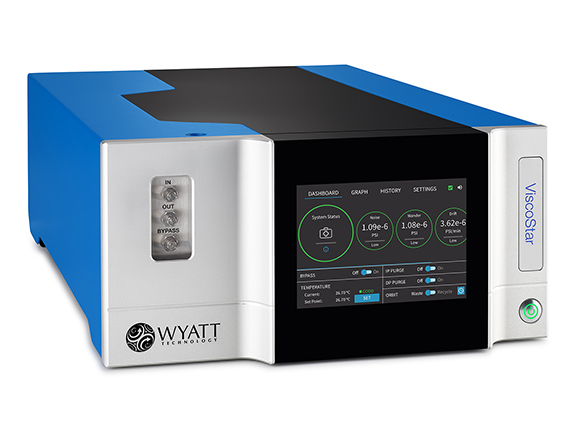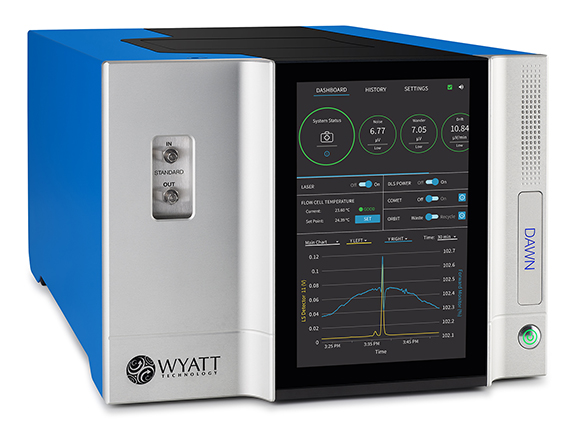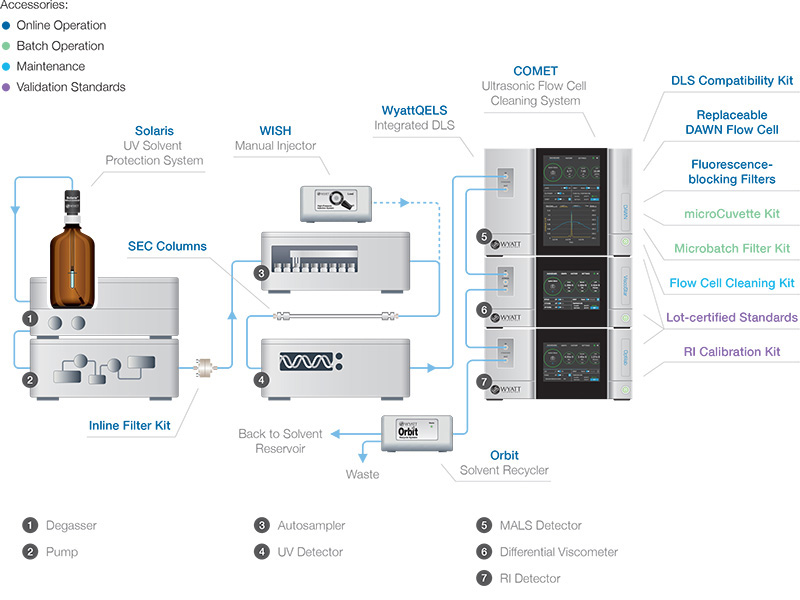SEC-IV
Intrinsic viscosity in conjunction with size exclusion chromatography (SEC-IV) has long been used by the polymer community to characterize molar mass. The two primary methods are Mark-Houwink analysis (using empirical values of Mark-Houwink coefficients from the literature) and Universal Calibration, which is appropriate for all linear, random coil polymers. Though these techniques are less rigorous than MALS, SEC-IV may be the optimal means of characterizing materials not amenable to SEC-MALS analysis:
- When the solvent and solute have the same refractive indices (making dn/dc=0), the polymer does not scatter light
- When the polymers fluoresce under excitation by the MALS laser, the fluorescence greatly increases the apparent scattering signal producing erroneous molecular weights. While a fluorescence blocking filter may be incorporated into the DAWN®, this does not always provide a sufficient solution to strongly fluorescing polymers.
The ViscoStar® differential viscometer coupled with an Optilab® differential refractometer to any GPC system provides superior measurements of intrinsic viscosity for characterization of all types of polymers. The ASTRA® software not only analyzes polymers based on the Mark-Houwink equation and Universal Calibration technique but, with a MALS detector, can even calculate Mark-Houwink coefficients.
But these instruments can do much more! By simply adding a DAWN, transform a basic SEC-IV setup into a powerful SEC-MALS-IV polymer characterization station, to analyze from first principles:
- Absolute determination of molar mass and size regardless of conformation
- Branched polymers
- Copolymers
- Measurement of Mark-Houwink coefficients ab initio
Selected references
Selected References
Striegel, A. M., Pitkanen L. Detection orthogonality in macromolecular separations: role of the on‑Line viscometer in characterizing polymers at conditions of “spectroscopic invisibility”. Chromatographia 2015, 78, 743-751.
Podzimek, S. Importance of multi-angle light scattering in polyolefin characterization. Macromol. Symp. 2013, 330, 81-91.
Abbas, S.; Lodge, T. P. Depletion interactions: effects of added homopolymer on ordered phases formed by spherical block copolymer micelles. Macromolecules 2008, 41, 8895-8902.
Striegel, A. M. Influence of chain architecture on the mechanochemical degradation of macromolecules. J. Biochem. Bioph. Meth. 2003, 56, 117-139.
Tarazona, M. P; Saiz, E. Combination of SEC/MALS experimental procedures and theoretical analysis for studying the solution properties of macromolecules. J. Biochem. Bioph. Meth. 2003, 56, 95-116.
Bielawski, C. W.; Benitez, D.; Grubbs, R. H. An "endless" route to cyclic polymers. Science 2002, 297, 2041-2044.
Application notes
Instrumentation for SEC-IV
Viscometer

ViscoStar® - A highly sensitive, on-line differential viscometer used in conjunction with SEC-MALS to determine the size and conformation of all types of biopolymers, synthetic polymers and even proteins and peptides.
The ViscoStar incorporates multiple novel technologies to provide the highest sensitivity, stability and solvent compatibility of any available viscometer for GPC. Its ease-of-use and serviceability make it the perfect companion for Wyatt's DAWN® light scattering and Optilab® refractive index detectors. Temperature controlled from 4 °C to 70 °C.
microViscoStar® - Similar to the ViscoStar but designed specifically for use with UHPLC/APC.
Refractive Index Detectors
Optilab® - A unique on-line differential refractometer for measuring concentration of any macromolecule, regardless of chromophores. Temperature controlled from 4 °C to 65 °C. The high-concentration option accommodates protein concentration up to 180 mg/mL.
microOptilab™ - The first RI detector specifically designed for use with all UHPLC systems.
MALS Detectors

DAWN® - The most sensitive MALS detector available, anywhere. Incorporates detectors at 18 angles to determine molar masses from 200 Da to 1 GDa and radii from 10 – 500 nm.
- Standard option: ambient temperature
- Heated/cooled option: -15 °C to +150 °C
- High-temperature option: ambient to +210 °C
The DAWN offers special options to handle fluorescent samples: fluorescence-blocking filters and an infrared, 785 nm laser.
miniDAWN® - Second only to the DAWN in sensitivity. Incorporates detectors at 3 angles to determine molar masses from 200 Da to 10 MDa and radii from 10 – 50 nm. Ambient only.
microDAWN® - The first MALS detector for UHPLC, with interdetector dispersion as low as 1.5 µL. Incorporates detectors at 3 angles to determine molar masses from 200 Da to 20 MDa and radii from 10 – 50 nm. Ambient only.
"Most versitile SEC detector on the market - great product."
"I have been using MALS since the 1980's - Wyatt's have always been the best value. This latest is very user-friendly. The combined information from the MALS and the viscometry detector can't be beaten. Branched co-polymers are no problem; great for pH." Mary Baker, MCPS
"Without this lot quality control checks for the product would have not possible."
"This is the only technology available for absolute molecular size determination with ease of use. It is highly reproducible and recommended for polysaccharide and conjugate vaccine manufacturers." Rajendar Burki, Biological E Limited
"Great machine, one must have it in a lab for characterizing polymers."
"It is a fantastic MALS detector, easy to use and vary reliable. I have used/seen this detector in many labs, always happy to work with this MALS detector." Yonggang Liu, Changchun Institute of Applied Chemistry
"An absolute must for today’s protein biochemist"
"This instrument is perfect for understanding protein/detergent complexes and ascertaining the stoichiometry of protein/protein complexes. Wyatt also offer an excellent training course which is backed up by an excellent support team who are always on hand to help out." George Orriss, University of Manitoba
Interested in other techniques or combining other techniques with SEC-IV?
SEC-MALS: Standard in protein, biopolymer and synthetic polymer characterizations labs around the world, Wyatt MALS detectors are valued for reliable and robust measurements.
FFF-MALS: Coupling an FFF system to a set of Wyatt MALS and/or DLS detectors creates a powerful system for accurate and robust characterization of molar mass and size distributions for simple or complex samples.
CG-MALS: Apply CG-MALS to characterize self- and hetero-association, binding affinity from pM to mM, absolute molecular stoichiometry (not just mole ratios) and more.
DLS: Measure the translational diffusion coefficients Dt of nanoparticles and colloids in solution by quantifying dynamic fluctuations in scattered light. DLS is suitable for ensemble measurements ranging from Rh values of 0.2 nm up to 5,000 nm.
MP-PALS: Wyatt Technology's breakthrough Massively Parallel Phase Analysis Light Scattering (MP-PALS) extends robust ELS measurements to proteins and other biomolecules in native buffer solutions. MP-PALS does everything conventional zeta potential instruments can do and much more.

